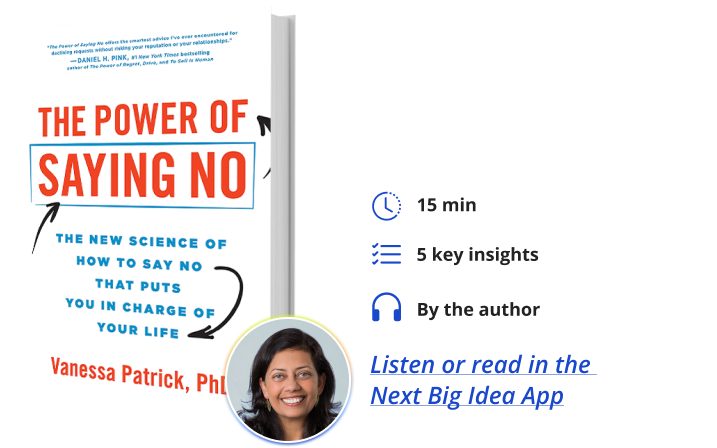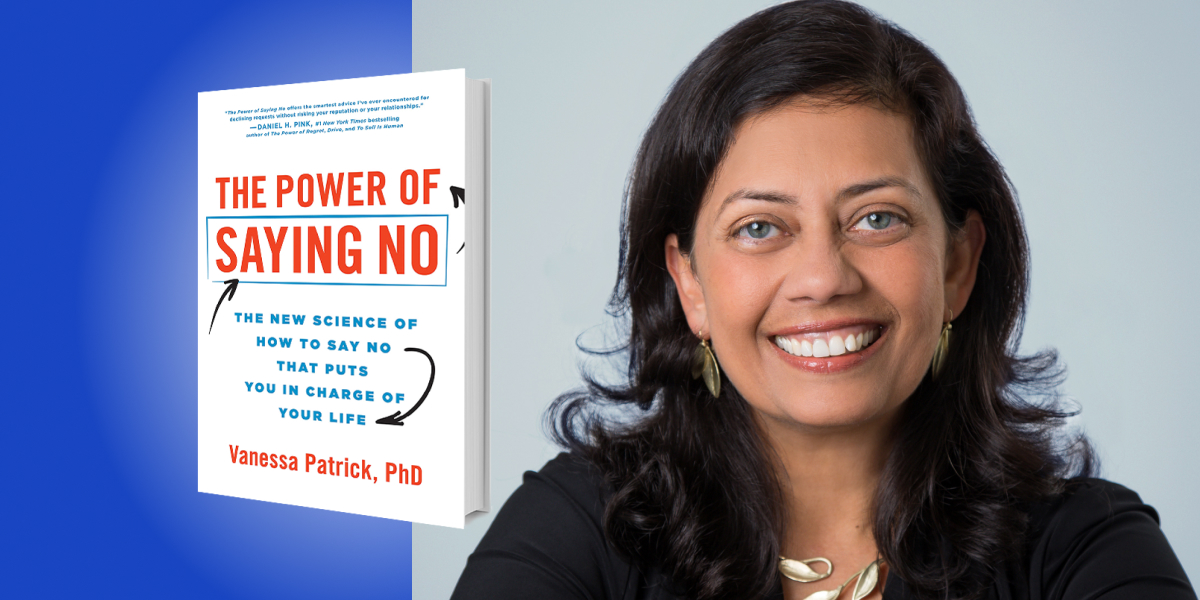Vanessa Patrick is a Professor of Marketing and the Associate Dean for Research at the Bauer College of Business at the University of Houston. She has a Ph.D. in Business from the University of Southern California and an MBA in marketing from Bombay University. She has published dozens of research articles in top-tier academic journals in psychology, marketing, and management, and her work has appeared in the New York Times, Wall Street Journal, NPR, Los Angeles Times, Business Week, Fast Company, Forbes, Huffington Post, and The Washington Post.
Below, Vanessa shares 5 key insights from her new book, The Power of Saying No: The New Science of How to Say No that Puts You in Charge of Your Life. Listen to the audio version—read by Vanessa herself—in the Next Big Idea App.

1. Why do we say “yes” when we want to say “no?”
If someone makes a request of you or invites you to go somewhere, and you want to say no, you should be able to say, “No, thank you” or, “Sorry, not interested.” Instead, saying no is quite often fraught with anxiety and riddled with feelings of conflict. Why? Because “no” is a dispreferred social response.
For most people, saying no is awkward and difficult, because it involves having to put aside other people’s expectations. We are hardwired to help and conditioned to be cooperative; we are psychologically poised to say yes, even when we want to say no. Simply put, we are social creatures with a need to belong, and we worry about two key things: our relationships and our reputation. We are concerned that saying no will risk our relationship with the asker, so we say yes when we want to say no. We are also concerned that saying no will damage our reputation, so we say yes so that people will see us in a good light.
In her book, The Creative Habit, dancer and choreographer Twyla Tharp describes a time when she agreed to choreograph “a bad piece of music” purely out of a sense of obligation to the asker. She spent six torturous weeks trying to make it work, and after she engaged in an intense practice with sixteen dancers and spent hours of studio time, Twyla Tharp was forced to admit that “Hollywood Kiss,” was simply not working out. She writes these words that all of us will do well to remember: “Whatever your reasons for starting with a project, whether crass or noble, they have to be clear and unencumbered. Obligation is a flimsy base for creativity, way down the list behind passion, courage, instinct, and the desire to do something great.”
2. Say “I don’t,” not “I can’t.”
How do you communicate an effective no? How do you say no in a way that maintains your relationship with the asker and keeps your reputation intact? This is where empowered refusal comes in. Empowered refusal is a super skill of saying no in a way that is persuasive and does not elicit pushback from others. An empowered no stems from your identity and gives voice to your values, priorities, preferences, and beliefs—but what matters is the words we use to say no. When we use, “I don’t…” “I never…” “I always…” These words reflect determination, commitment, control, and empowerment.
“Empowered refusal is a super skill of saying no in a way that is persuasive and does not elicit pushback from others.”
Consider the following example: You run a big organization and prefer to have your mornings open to do some strategic long-term planning. As a leader, you need to think about where your business is and where you need to go. Instead, you find yourself being pulled into early morning meetings almost every day and trying to come up with excuses to explain why you can’t participate in the meetings. It would be easier to inform your team that you don’t do early morning meetings.
This simple swap of words speaks volumes. When we replace the helpless and disempowered “I can’t” with the empowered phrase “I don’t” we convey a decisive and firm stance and do not invite negotiation. With these words, we clearly communicate, “I am not the kind of person who does early morning meetings,” and people will listen.
Because “empowered refusal” comes from a place of personal power, it puts you in the driver’s seat of your own life and is less likely to invite pushback, strain, or damage your relationship with the asker, or to hurt your own reputation.
3. Master the ART of “empowered refusal.”
One of the strongest advocates for the power of saying no has been Oprah Winfrey. On April 10, 1994, Oprah wrote the words that she keeps on her desk as a daily reminder: “Never again will I do anything for anyone that I do not feel directly from my heart. I will not attend a meeting, make a phone call, write a letter, sponsor, or participate in any activity in which every fiber of my being does not resound yes. I will act with the intent to be true to myself.” How do we develop this Oprah-inspired behavior ourselves? By using a handy acronym, ART which stands for Awareness, Rules not Decisions and Totality of Self.
Empowered refusal must be you-centered. A key competency you need to develop in this regard is self-awareness. To say no to something effectively, you need to look inwards and develop an understanding of your own values, beliefs, priorities, and preferences. This deepened self-awareness will enable you to sift between the “good for me” activities and the “not good for me” activities and help you decide what to say yes to, and what to say no to.
“To say no to something effectively, you need to look inwards and develop an understanding of your own values, beliefs, priorities, and preferences.”
The second competency is to rely on that self-knowledge to create simple rules, or “personal policies,” that guide your decisions and actions. Personal policies help strengthen your refusal and empower you to say no with conviction and determination. When we lean on our personal policies we come across with greater conviction and determination.
The third competency is to remember that empowered refusal is a whole body activity that involves both verbal and non-verbal communication cues to be effective. A refusal is an act of communication. When you use empowered language like “I don’t,” “I always,” or “I never,” you need to accompany these words with empowered body language and non-verbal gestures. Include a smile, lean forward, or use friendly gestures to reinforce that your refusal is about you and your preferences, and not a rejection of the asker.
4. Use a cost-benefit framework to decipher the asks that come your way.
We need to become experts at categorizing the asks that come our way to separate the grain (the resounding yeses) from the chaff (the things you should and want to say no to). Consider a simple cost-benefit scheme that requires you to consider the costs to you, in terms of time, energy, and other resources of complying with the request, and how this is weighed against the benefits that the asker obtains if you say yes to the request.
Consider a “low-cost to you” request that confers a great benefit on the asker, a “pass the salt” ask. If you are at the dining table and someone asks you to pass the salt, if the salt shaker is in front of you, you simply hand it over; it is a “low-cost to you” action. “Low-cost to you” requests are easy for you to do or are well aligned with your purpose. A “high benefit to others” request is one that you are uniquely poised to do, is aligned with your expertise, and expands the impact that you can have on the world.
“We need to remember that everything is a trade-off.”
The opposite asks are “high-cost to you” and “low-benefit to others” asks, or “bake your famous lasagna” asks. These are asks that do not consider the amount of effort you are being asked to invest to perform a trivial task. Say an empowered no to these types of asks.
We need to remember that everything is a trade-off. When we say yes to something, we have to say no to something else. The “hero’s journey” asks, for instance, are requests that we might say a resounding yes to. Although they might be a high cost to you, they can be a high benefit for others and allow you the opportunity to contribute meaningfully to the world. To fully invest yourself in “hero’s journey” asks and make a positive difference in the world, you need to say an empowered no to the things that don’t matter.
5. How to say no to pushy askers.
Sometimes, even though you have mastered the art of “empowered refusal,” you might come across people who will not take no for an answer. How do you spot these pushy askers and then how do you stand your ground using empowered refusal?
Learn to spot how pushy askers operate. First, they prefer to make a face-to-face request since people are 33 times more likely to say yes to face-to-face requests. Second, they will choose a location where they have a home court advantage, like their own home or office or at a restaurant where they are footing the bill. Finally, they will insist on an immediate response. Recognizing pushy askers and making it your personal policy to never say yes in the heat of the moment, gives you the opportunity to say an empowered no to the things you don’t want to do.
The beauty of an empowered refusal is that since it is based on your identity, you are better able to withstand external pressure and stay steadfast and strong. You can also rely on strategies that put a distance between you and the pushy asker. Let me share one specific practical strategy: use technology as a buffer. It is easier to re-state your no and invoke your personal policy via email or text message. We can use a thumbs-down emoji or a no emoji to visually reinforce your no response.
What is important for us to remember when dealing with pushy askers is that it is our responsibility to protect our time, focus on our top priorities, and use the power of saying no to reach our goals at work and at home. My research shows that empowered refusal is a unique, positive, and meaning-filled way to manage your time, energy, and ambition and allows you to make a lasting, positive change in your life.
To listen to the audio version read by author Vanessa Patrick, download the Next Big Idea App today:































